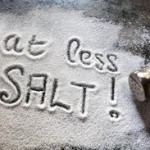A person’s average daily intake of salt is 3900 milligrams, but if you have normal blood pressure experts recommend that you should limit your salt intake to 2,400 milligrams a day.
Don’t make an effort to cut back less of what is recommended unless you have high blood pressure. Recent studies have shown that taking too much salt is unhealthy.
It can aggravate and make your hemorrhoids worse. Excess salt consumption retains fluids in the circulatory system that can cause bulging of the veins in the anus and elsewhere.
High salt intake can also trigger migraine in some people. migraine is a throbbing headache, usually occurring on only one side of the head.
In a study conducted at the Department of Community Medicine of St. Thomas Hospital in London, researchers discovered that salt could have a life threatening effect on people with asthma.
Most kidney stones are calcium based, so it’s essential that you avoid excessive intake of table salt and condiments high in sodium.
Salt restriction will help decrease the concentration of calcium in the urine. According to the US National Kidney Foundation, you should reduce your sodium intake to two to three grams per day.
Women with premenstrual syndrome (PMS) should avoid salt at all cost. High salt content can contribute to water retention, according to Dr. Susan Clark, medical director of PMS and Menopause Self-Help Center in Los Altos, California.
Most snack foods and other processed foods are high in salt and some fast foods meals can be extremely high, so, women with PMS should stay away from these foods. Before buying packaged and processed foods , be sure to read the labels and whenever possible, choose fresh fruits and vegetables.
Herewith, are the good things that you can do about the many uses of salt:
*** If you are suffering from stuffy nose, try saline solution by dissolving a teaspoon of salt in a pint of water, and then use a nose dropper to drop it in your nose. Gently blow your nose on a tissue paper.
*** If you have a gum pain, try a warm saltwater rinse by taking a few swigs of warm saltwater and swish it between your teeth and gums, advises Dr. Leslie Salkin, director of post graduate periodontics at the Temple University, School of Dentistry in Philadelphia. He recommends a teaspoon of salt in a glass of lukewarm water.
*** If you are suffering from toothache, warm salt water is to be used. Hot or cold water will only aggravate an already sensitive tooth, but swishing with some warm salt water will relieve a lot of pain, according to Dr. William Maher, assistant professor of endodontics at the University of Detroit Mercy School of Dentistry. Mix two to three teaspoons of salt in a glass of water. The salt draws out some of the fluids causing the swelling and has a general soothing effect. The saltwater rinse also cleans the area around the infected tooth.
*** If you have a sore throat, salt can also be used as a first line of defense against sore throat. While gargling won’t kill off the germs that cause sore throat, it will moisturize and temporarily soothe the upper throat. While there are the many possible gargles in the market, saltwater is good as any and it’s cheap.
Dr. Michael Benninger, chairman of the Department of Otolaryngology at Henry Ford Hospital in Detroit, suggests: Mix a teaspoon of salt (no more or you’ll dry out your mouth) in a pint of warm water (never hot).
To gargle, start by taking a deep breath. Pour a small amount of salt water into your mouth and tilt your head back . Let stir bubble out slowly to create the gargling effect. If it’s noisy, it’s right. Gargle as often as you like.
